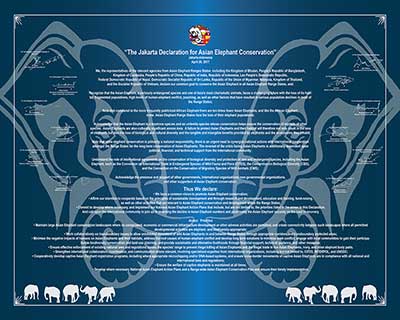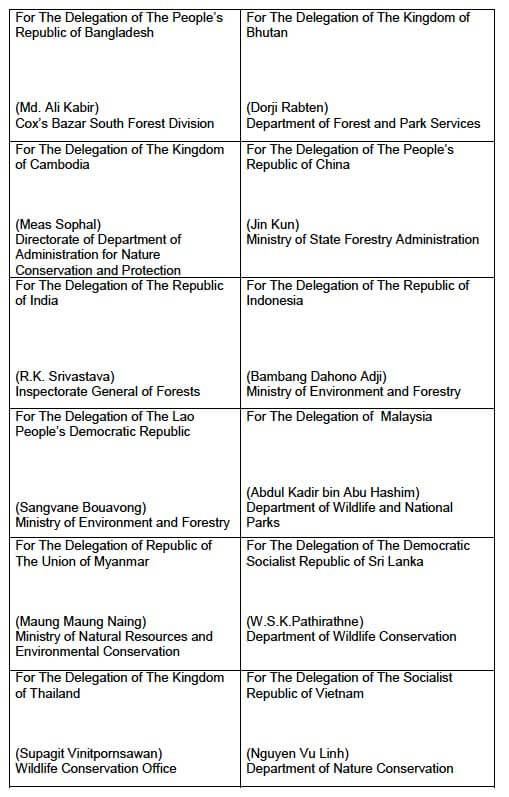THE JAKARTA DECLARATION
FOR ASIAN ELEPHANT CONSERVATION
JAKARTA, INDONESIA
April 20, 2017
We, the representatives of the relevant agencies from Asian Elephant Ranges States including the Kingdom of Bhutan, People’s Republic of Bangladesh, Kingdom of Cambodia, People’s Republic of China, Republic of India, Republic of Indonesia, Lao People’s Democratic Republic, Federal Democratic Republic of Nepal, Democratic Socialist Republic of Sri Lanka, Republic of the Union of Myanmar, Malaysia, Kingdom of Thailand, and the Socialist Republic of Vietnam, declare our common goal to conserve the Asian Elephant in all Asian Elephant Range States, and:
Recognize that the Asian Elephant, a seriously endangered species and one of Asia’s most charismatic animals, faces a challenging future with the loss of its habitat, fragmented populations, high levels of human-elephant conflict, poaching, as well as other factors that have resulted in serious population declines in most of the Range States;
Note that compared to the more frequently publicized African Elephant there are ten times fewer Asian Elephants, and like the African Elephant, some Asian Elephant Range States face the loss of their elephant populations;

Acknowledge that the Asian Elephant is a keystone species and an umbrella species whose conservation helps ensure the conservation of myriads of other species. Asian Elephants are also culturally significant across Asia. A failure to protect Asian Elephants and their habitat will therefore not only result in the loss of elephants but also the loss of biological and cultural diversity and the tangible and intangible benefits provided by elephants and the ecosystems they inhabit;
Note that while elephant conservation is primarily a national responsibility, there is an urgent need to synergize national actions with international cooperation amongst the Range States for the long-term conservation of Asian Elephants. The reversal of the crisis facing Asian Elephants is additionally dependent upon political, financial, and technical support from the international community;
Understand the role of international agreements on the conservation of biological diversity and protection of rare and endangered species, including the Asian Elephant, such as the Convention on International Trade in Endangered Species of Wild Fauna and Flora (CITES), the Convention on Biological Diversity (CBD), and the Convention on the Conservation of Migratory Species of Wild Animals (CMS);
Acknowledge the presence and support of other governments, international organizations, non-governmental organizations, and other supporters of Asian Elephant conservation.
Thus We declare:
- We have a common vision to promote Asian Elephant conservation;
- Affirm our intention to cooperate based on the principles of sustainable development and through research and development, education and training, fund-raising, as well as other activities that are relevant to Asian Elephant conservation and development within the Range States;
- Commit to develop where necessary, and implement our National Asian Elephant Action Plans that include, but are not limited to, the priorities listed in the annex to this Declaration.
And call upon the international community to join us in reversing the decline in Asian Elephant numbers and positioning the Asian Elephant securely on the road to recovery.
Annex: Priorities
- Maintain large Asian Elephant conservation landscapes where no unregulated, economic or commercial infrastructure development or other adverse activities are permitted, and create connectivity between such landscapes where all permitted developmental activities are elephant- and biodiversity-appropriate;
- Work collaboratively on transboundary issues to allow uninhibited movement of wild Asian Elephants in and between Range States through appropriate corridors and transboundary protected areas;
- Minimize the negative impacts of humans on Asian Elephants and their habitats, address the root causes of human-elephant conflict and develop long term solutions to minimize such conflict; engage with local communities to gain their participation in biodiversity conservation and land-use planning; and provide sustainable and alternative livelihoods through financial support, technical guidance, and other measures;
- Ensure effective enforcement of existing national laws and regulations across the species’ range to prevent illegal killing of Asian Elephants and the illegal trade in live Asian Elephants, ivory, and other elephant body parts.
- Strengthen international collaboration, coordination, and communication where relevant, involving specialized expertise from international organizations, including but not limited to, CITES, INTERPOL, and UNODC;
- Cooperatively develop captive Asian Elephant registration programs, including where appropriate microchipping and/or DNA-based systems, and ensure crossborder movements of captive Asian Elephants are in compliance with all national and international laws and regulations;
- Ensure the welfare of captive elephants is maintained at all times;
- Develop where necessary National Asian Elephant Action Plans and a Rangewide Asian Elephant Conservation Plan and ensure their timely implementation.

DONE in Jakarta, Indonesia on the Twenty Day of April in the Year Two Thousand and Seventeen, in a single original copy in the English language.



